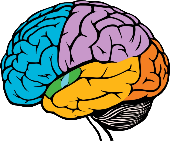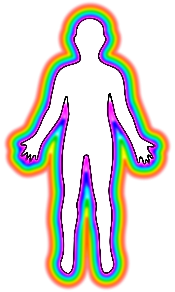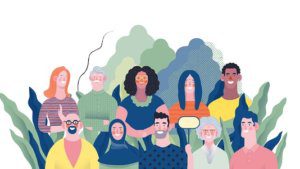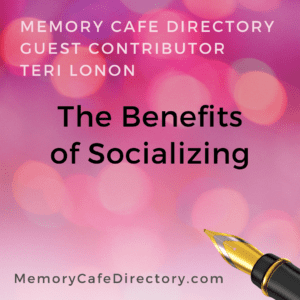Memory Cafe Directory posts and/or links to retailers can be advertising, sponsored, or affiliate links. We may earn a small commission from them. Thank you.
Guest Contributor: Teri Lonon
Maybe I should say “socialization”, but that sounds scientific and formal. As a caregiver, the notion of getting out and seeing others is not foreign, it just isn’t easy.
Dementia-friendly environments seem scarce, but the possibilities are endless.
While living with a type of dementia, your loved one still needs physical, visual, and auditory stimulation. They still have a need to connect and communicate with others. As a matter-of-fact, we ALL need this to maintain quality in our lives.
Have you ever had “cabin fever”? If so, take that feeling, add confusion and the inability to think of ways to safely get out of the house (or facility). That is how dementia feels during isolation. Don’t let fear contribute to the isolation of your loved one or yourself.
Good for the Brain
A person diagnosed with a type of dementia experiences loss of cognition in many areas. These include language, judgement, abstract thinking, organization, perception, reasoning, attention, and of course, memory. Social interaction is a big part of cognitive development in our lives, therefore, social activities help keep our brains active.
Social stimulation helps to keep these areas as active as possible. It has also been proven to lower stress levels and decrease anxiety and depression. When an activity is completed or a social connection made, self-esteem improves.

Courtesy Teri Lonon
Our brains LOVE that!
Social interaction improves mental health. As a caregiver, being proactive about engaging with others is vital, for yourself and your loved one. Many chemical reactions in the brain are a result of socializing, such as Dopamine generation. Also, face-to-face contact can actually help release oxytocin and lower stress!
Visual and auditory stimulation are good for the brain. Music, aromas and tastes can bring back positive memories. Music not only activates parts of our brains, but music that we KNOW and LIKE cause the release of “feel-good” hormones. I’m sure you have noticed your own loved one perk up to an old favorite on the radio.
Good for the Body
Physical stimulation should be individualized. Each person has their own abilities, preferences and comfort levels. Yoga, stretching, Tai Chi and other practices can be guided from a screen or in small groups. These can also be adapted for those needing to sit. These are great for muscle strength, flexibility, relaxation and improved circulation.

Courtesy Teri Lonon
Social activities outdoors provide fresh air, new environments, and movement. “Gardening” can include watering plants, sitting on a bench to dead-head flowers, or repot seedlings. You don’t have to join a garden club. Invite a friend, assist your loved one in potting plants, and delivering them to neighbors or friends. These also involve movement, eye-hand coordination, sights and smells.
Dancing is always a favorite! Lively music from your favorite era, chair-dancing, singing along or clapping brings benefits for your loved one and others.
If your loved one is mostly passive, for medical or cognitive reasons, how about a salon manicure? A shampoo and haircut or style is another way to socialize and enjoy physical stimulation at a salon. Sights, smells and social communication are all included! Naturally, a companion would accompany anyone living with dementia. As society opens up it’s business doors more, these will become available.
Where is it Dementia-Friendly and Covid-Safe?
The number one place is a Memory Cafe! The staff has knowledge and empathy to guide you and your loved one. You can BOTH enjoy socializing on your own comfort level. As we become an “after-Covid” world, you will see more of these caregiver hang-outs open up. Also available are Virtual Memory Cafes. At these venues, you can find music or dancing or games or engaging speakers but most of all friends!

Courtesy Teri Lonon
Other ideas include guided nature walks, museum tours, small family gatherings, library visits, and Adult Day Programs. While your loved one socializes in these venues, so can you!
What’s the Point?
Caregivers and their loved ones need socialization. It has physical, mental, and emotional benefits. You both can still experience the boost of refreshment through relationships and new experiences.
Teri Saunders Lonon TRS CDP

Teri Lonon
Teri received her BS in Therapeutic Recreation. She worked 15 years in facilities with memory care residents and their families before coming to Elder Options. She has been there almost 3 years and is currently a member of the Caregiver Training and Support Team.
Elder Options is the Area Agency on Aging in 16 counties in North Central Florida. During the pandemic, Elder Options has continued it’s mission to serve seniors by working remotely and online.
The office is based in Gainesville, Florida and provides the Elder Helpline 1-800-262-2243 as well as resources and community outreach. More information and registration for classes can be found on the Elder Options website.
Become a Contributor!
 Do you want to be a Memory Cafe Directory contributor? If you have helpful information to share with our community, read about the guidelines, then get in touch to discuss what you have to offer.
Do you want to be a Memory Cafe Directory contributor? If you have helpful information to share with our community, read about the guidelines, then get in touch to discuss what you have to offer.
Thank you.





